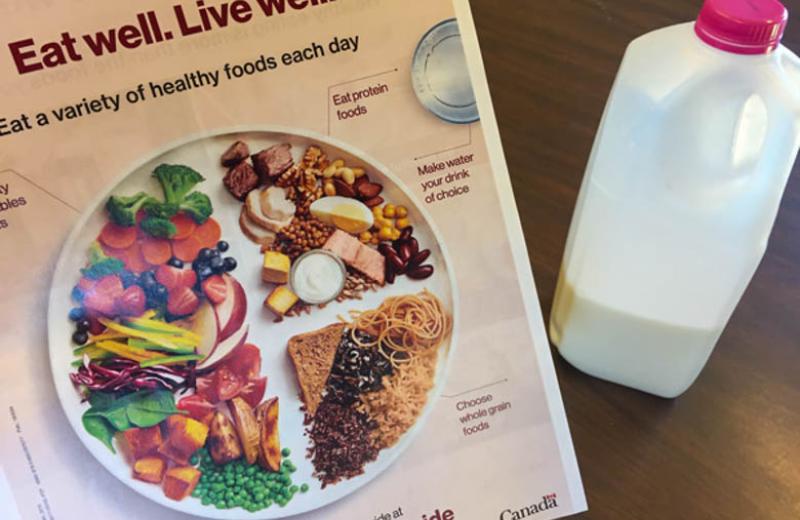In the lead up to the release of Canada’s new food guide, there was much chatter about milk, particularly around whether milk would be removed or not.
The food guide, which provides eating advice for healthy Canadians two years of age and older, was launched in January 2019 with a brand new look. The rainbow with the four food groups was replaced with a plate with three food categories: vegetables and fruits, whole grains, and protein foods. Something else appears to be different – a glass of water is shown with this plate. So, the question still remains: was milk wiped from the food guide?
Milk: Still got it!
The new food guide features a section on the plate called protein foods, which combines foods from the older meat and alternatives, and milk and alternatives food groups. Protein foods include lentils, beans, chickpeas, tofu, nuts, seeds, meat, fish, and poultry. This is also where we now find milk and products like cheese, yogurt, and kefir (fermented milk), as well as unsweetened fortified soy beverages. As the name implies, these protein foods are all good sources of protein and various related nutrients.
Milk: A nutritious beverage
So, for those of you who enjoy milk, rest assured that this nutritious beverage can continue to have a place in your diet. There are good reasons that milk has stayed in our federal dietary guidance:
- Milk is a great source of various nutrients, such as protein, vitamin B12, and calcium.
- In Canada, cow’s milk is also fortified with vitamin D, a nutrient that is available in only a few foods.
- Milk is also widely available and can be enjoyed with many other foods, making it an easy and versatile source of these key nutrients.
Unsweetened fortified soy beverages: Also an option
What if you don’t drink milk? No worries - you can get similar nutrients from other sources. The most nutritious non-dairy drink is fortified soy beverage; in the older version of Canada’s food guide, soy beverage was listed in the milk and alternatives food group, along with milk. In the new food guide, soy beverage is the only plant-based drink that is nutritious enough to be grouped with the protein foods. Unsweetened fortified versions are recommended and these are an option for Canadians two years and older (note: soy beverages are not recommended for children under two years of age).
Other plant-based beverages: Not so nutritious
You might be wondering, “what about other plant-based beverages?” These include drinks made from almonds, cashews, hemp, coconut, rice, potatoes, and others.
It’s important to know what these beverages offer in the way of nutrition – it varies! In general, these drinks are poor sources of protein, containing as little as 0 or 1 gram of protein per cup. Compare that to 9 grams of protein from cow’s milk and 7 grams of protein from soy beverages. Plant-based beverages are also naturally low in many other nutrients, though some vitamins and minerals are added into commercial products that are fortified (check the labels). For some nutrient comparisons, check out this related article: Understanding Non-Dairy Beverages.
Since even fortified versions of plant-based beverages are low in protein (except soy) and many other nutrients, these drinks are not recommended for infants and toddlers. If they are offered to children over two years, careful meal planning is required to ensure that they are meeting their nutrient needs through other sources. Are you wondering what is recommended for children? Stay tuned for another blog post, coming soon: Milk and young children: What you need to know.
The bottom line
Milk continues to be a hot topic! Hopefully this article has provided clarity on how milk, fortified soy beverages, and other plant-based beverages fit within the updated food guide. That said, our diets are deeply personal, and a lot affects how and what we eat. A dietitian is a great resource and can help you choose beverages to meet your family’s nutritional needs.
- There are dietitians in various communities across Northern Health. A referral may be required. Talk to your health care provider to learn more.
- BC residents can also access Dietitian Services at HealthLink BC, by calling 8-1-1 (or 604-215-8110 in some areas) and asking to speak with a dietitian.














Comments